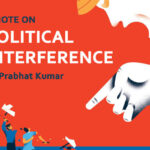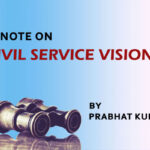As a rule, the civil servants are wary of presenting the authentic side of their personality to their colleagues, their subordinate staff and to their clients. This may appear to be a very hard statement. But show me half a dozen of autobiographies of eminent bureaucrats exposing their inauthenticities, and I will change my opinion.
I might add that most other professionals do the same. Politicians do it all the time, but it’s also something that many of the civil servants do on a regular basis, in both their personal and professional lives. We dread showing our real face fully. Perhaps we are afraid that showing our real face will devalue us in the eyes of the world. Or perhaps, we are not even aware of our true self.
In the present context, I presume we understand the word ‘authentic’ as signifying realness, and not connoting its other meanings like legitimacy, trustworthiness, credulity or reliability. Authentic in the present perspective implies ‘not fake’. I do not intend to confuse it with other desirable attributes like honesty or integrity. They can be addressed separately.
Authenticity is one of the most valued characteristics in our society. As children we are taught to just ‚be ourselves‛. The time-tested advice of ‚be yourself‛ stands for a reason. It may be a cliché but it is as true as ever. What can be inferred from this valuable knowledge is this: Be true to yourself means that you should be an honest person who lives by a code of morals and values. Be true to yourself is fundamental to living a life of integrity. Your duty to your obligations and your fulfilment of them should become your character.
There are high-character public servants who don’t just talk the talk, they also walk the talk. It means they back up their words by action. ‘Be true to yourself and do what you say you’re going to do. Your yes should be yes and your no should be no for all intents and purposes’.
But the big question is whether it means that you should reveal your true self to everyone who comes in contact with you, particularly in your working life.
Authenticity in the sense I am talking implies that one should be authentic about one’s inauthenticities, one’s weaknesses, one’s frailty and one’s vulnerabilities. Or in other words, she should not fake about her real self. She should actually be what she
holds out to be to others. And also, she should actually be what she holds out to be to herself.
Incidentally, a discussion on authenticity will not be complete without mentioning another notion: Deception.
To date, most research on deception has focused on two types: lying by commission (using false statements) and by omission (not disclosing relevant information). For example, deceiving by omission is observed routinely while answering inconvenient parliamentary questions raised by the opposition. Civil servants are quite adept at giving statements that hide the truth but technically are not a lie.
Distorting the truth without actually lying has a name: paltering. Most of us do it, and according to a Harvard study, most of the people feel more comfortable with paltering than with out-and-out lying.
In a study, when people were asked to playact as deceivers and those deceived, it was discovered that participants felt better about hiding the truth rather than flat lying; they thought their actions were more ethical because they were technically not telling the untruth. But when their deception was revealed, their counterparts graded them just as negatively as if they had lied by commission.
Therefore, when people discover that a functionary or a colleague has deceived them by not revealing the full truth in the past, they are unlikely to treat that person as being authentic.
‚Everybody’s got to use their own compass,‛ Todd Rogers of Harvard Kennedy School says, ‚but how others might see you is definitely something to keep in mind.‛
Researchers are calling into question authenticity as a rationally sound concept. As they analysed authenticity minutely, they found a little bit of disorder in it.
Firstly, there seems to be a lack of consensus among them what does authenticity actually mean. Is being authentic synonymous with being in full conformity with one’s actual beliefs, values, attitudes and emotions? That is, you are willing to be put against light and people can see through you. Or it means that one is authentic if he/she is fully compatible with his/her chosen beliefs, values, attitudes and emotions? In other words, is being true to the chosen personality trait (not the real trait) authenticity?
Mr Tikku and I had a common boss (joint secretary) in the Ministry of Home Affairs when we were working on the integration of Sikkim in Indian Union. Once Mr Tikku committed a grave error in preparing a report for the Prime Minister. Fortunately it
was detected in time. Mr Tikku was called by the joint secretary and told to be more careful in future. When he had left the joint secretary’s room, the boss turned to me and said that he felt like thrashing Mr Tikku, but considering the seniority of Mr Tikku, he did not scold him. He wanted to show himself as a kind boss, and was being true to his assumed value. Whether the joint secretary was authentic?
Contrary to my joint secretary, the Secretary of the Department of Personnel was a temperamental bully. He used to take delight in finding faults with every officer of the department without an exception. He would admonish senior officers for minor grammatical and spelling mistakes in the drafts and throw files at them; his loud scolding could be heard in the corridors of the North Block. Was his authenticity a commendable personality trait?
Another thorny issue is measurement. Virtually all measures of authenticity involve self-report measures. You have to know your real nature before acting in conformity with it. However, people often do not know what they are really like or why they actually do what they do. So it is not fair to judge their authenticity by the way they act.
Importantly, how can we measure authenticity of our actions? Perhaps a polygraph test following our actions could tell us whether we have acted in conformity with our true self or not. A polygraph machine records the body’s involuntary responses to an examiner’s questions in order to ascertain deceptive behaviour. The test measures physiological data from three or more systems of the human body-generally the respiratory, cardiovascular, and sweat gland systems. When we lie, the detector shows significant changes in physiological responses: a faster heart rate, higher blood pressure, increased perspiration. Telling a lie creates stress in the body. I suspect that hiding the truth about ourselves or suppressing who we are could create similar stresses in our bodies, thereby measuring authenticity of our perceived actions.
Pragmatic authenticity does not necessarily mean that you become totally transparent about your negative side. The negative side is you; the positive side is also you. And it is not always possible to change yourself. If you show your negative side, your vulnerabilities through your actions, chances are that people may not follow you or even reject you. Perhaps it is more diplomatic to assume a persona for yourself and act in conformity with it.
Pragmatic authenticity is not about going around saying whatever is on our mind, including our darkest impulses. Instead, healthy authenticity, of the sort that helps us become a whole person, involves accepting and taking responsibility for our whole
self leading to personal growth and healthy relationships. Pragmatic authenticity is an ongoing process of discovery of self-awareness and integrity with our consciously chosen values and attitudes.
Therefore, what we think of as our true self may actually just be what we want to be seen as. Consequently, we will be feeling highly authentic when the way others think of us is congruent with how we want to be seen, and when our actions are conducive to establishing, maintaining, and enjoying our assumed reputation.
I will end with a personal note. I think I have not done badly in whatever I have attempted in life. People believe that I have distinguished myself in the civil service and have not been lacking in intellectual pursuits. I consider myself blissfully happy without any regrets. But now that I am nearing the end of my stay on Earth, I wish I had had the courage to live a life true to myself, not the life others expected of me. I have no hesitation in admitting that if there was no gentle pressure or unexpressed expectations of those dear to me, I would have lived life somewhat differently. During my life, there came several points of inflexion, where my heart wanted to take a different route. But that would have been more selfish.
How would I be judged on authenticity?
Prabhat Kumar


